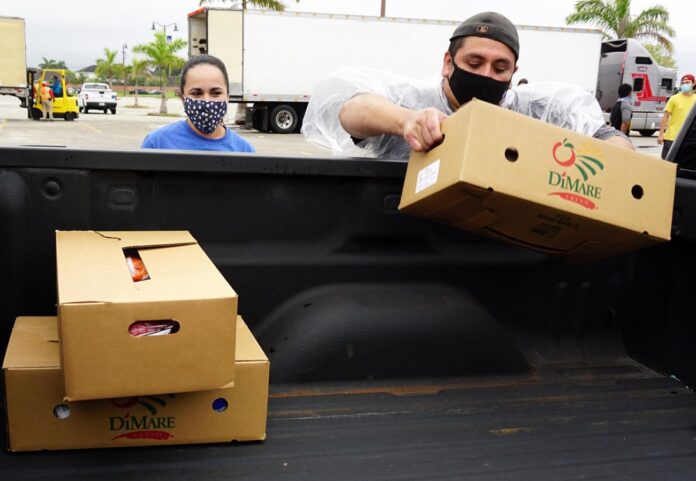With 2020 almost coming to an end, non-profits throughout Brownsville are working hard to continue to meet the food needs of those who have been affected the most by the COVID-19 pandemic.
With almost 100,000 bags of food distributed so far, and thousands more to be distributed this month, United Way of Southern Cameron County said the need continues to increase in the community and it’s expected to continue throughout 2021.
“We are working very hard to continue distributions next year. We are still working on attaining funding to continue the effort as long as it’s needed,” Wendy De Leon, development and communication director, said.
“Right now, we are at the point where we would do whatever it takes to continue employing the furloughed workers to help us get more food to people more quickly, but we are also working on seeking funding, of course, to get food so that the workers can work with the food, because it’s all tied together. We have seen an increase in demand, which is crazy, because we did think it would slow down, maybe a little bit, by this point.”
United Way of Southern Cameron County founded “United Against Hunger” earlier this year when the pandemic started to hit Brownsville. At first, they would distribute 1,000 food bags a week, then 1,600 and now they distribute 2,500 and still are not able to meet the demand. De Leon said every week 25 to 75 cars are turned away at the mass distributions.
“We have people camping out at 11:30 p.m. the night before just to receive that bag, just to make sure that they’re in line and they don’t get cut off because we are still cutting from 25 to 75 cars,” she said. “

For some reason, the spike just peaked up and I know that not only do the holidays have a lot to do with it but the fact that the kiddos are still at home and they are eating at home. It’s a big help when you send your kids to school and they have their three meals at school already because they do serve breakfast, lunch and send the kids home with dinner most of the time.”
De Leon said the food given at the mass distributions is just the basic necessities, such as canned food, rice and beans. She added in partnership with the Brownsville Wellness Coalition sometimes they are able to provide fresh produce.
“We are seeing an increase. Farmer’s to Families was distributing to us so that was a big help because it would supply us with produce and they no longer are distributing to us directly. Now, they are distributing only to food banks so we are not getting that food anymore,” she said.
“We are working with our local partners, like Brownsville Wellness Coalition, to try to get the produce out there. We don’t just want them to get that bag of non-perishables, but we want our families to get their veggies because it is something that it’s very needed when it comes to cooking.”
At Good Neighbor Settlement House things are not different. Hugo Zurita, executive director, said they went from distributing food to 700 families a month to about 2,000. Good Neighbor also provides daily breakfast, lunch and dinner.
“From April to now, our numbers have tripled,” he said. “Every month we see about a 25 percent increase, and that’s just in our food pantry. Same thing, we were expecting it to go down to how it was in March or February but it hasn’t gone down, it keeps increasing.”
Zurita said when it comes to the meal program, the numbers have remained steady because next door there is a distribution spot by Brownsville Independent School District. He said the need will continue next year.
“There will still be a need,” he said. “Believe it or not, people are still losing their jobs, people are still applying for jobs, people are still needing assistance.”
To donate to United Against Hunger, visit unitedwayrgv.org.
To donate to Good Neighbor, visit goodneighborsh.org.




